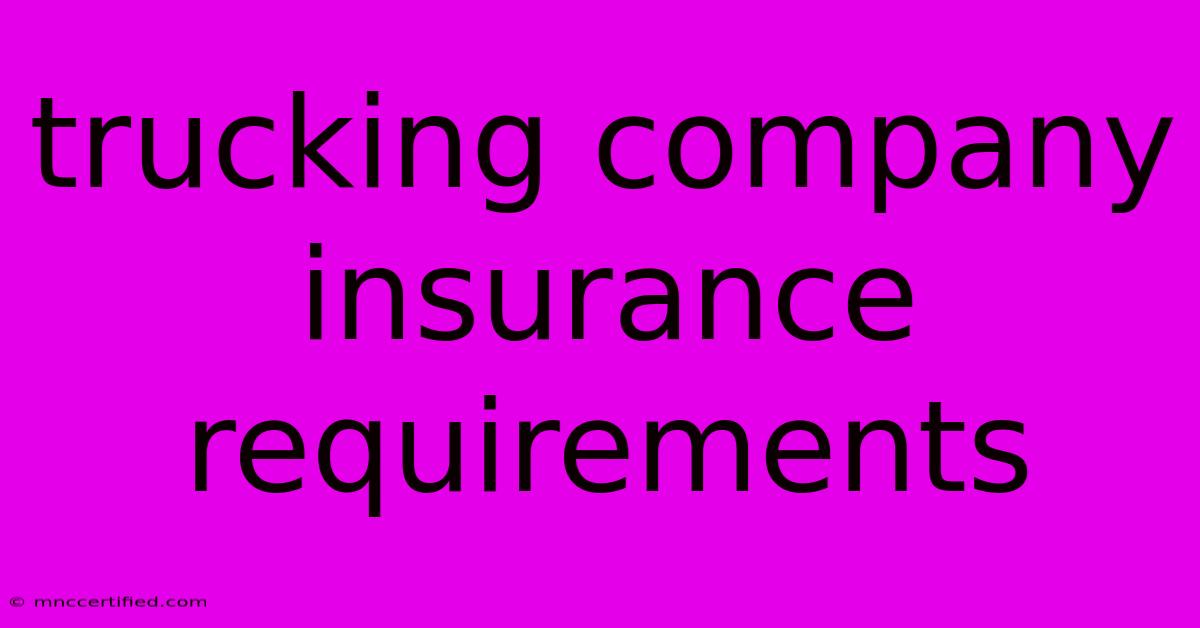Trucking Company Insurance Requirements

Table of Contents
Navigating the Complex World of Trucking Company Insurance Requirements
Starting or managing a trucking company comes with a lot of responsibilities, and insurance is a crucial one. Not only is it a legal requirement, but it also provides financial protection against potential risks and liabilities. Understanding the different types of insurance and their importance is key to running a successful and secure business.
Why is Trucking Company Insurance Essential?
Trucking companies face unique risks, including accidents, cargo damage, and liability claims. Insurance acts as a safety net, covering potential financial losses and protecting your business from catastrophic events.
Here are some key reasons why trucking company insurance is essential:
- Legal Compliance: Most states and federal regulations mandate specific types of insurance for trucking companies. Operating without proper coverage can lead to hefty fines and penalties.
- Financial Protection: Insurance safeguards your company from significant financial burdens arising from accidents, cargo theft, or lawsuits.
- Reputation Management: A strong insurance policy demonstrates your commitment to safety and professionalism, building trust with clients and partners.
- Peace of Mind: Knowing you have adequate insurance coverage allows you to focus on running your business without constant worry about unforeseen risks.
Essential Types of Insurance for Trucking Companies
1. Commercial Auto Liability Insurance: This is the most fundamental coverage for trucking companies. It protects you against financial losses arising from accidents involving your trucks, including:
- Bodily injury liability: Covers medical expenses and lost wages for individuals injured in accidents caused by your drivers.
- Property damage liability: Pays for damages to other vehicles or property involved in accidents caused by your drivers.
2. Cargo Insurance: This policy covers the value of goods transported by your trucks. It protects you against losses due to:
- Damage or loss in transit: Covers accidental damage or loss of cargo during transportation.
- Theft or pilferage: Protects against theft or unauthorized removal of cargo.
3. General Liability Insurance: This covers a wide range of risks related to your business operations, including:
- Property damage: Pays for damages to other people's property caused by your business operations.
- Bodily injury: Covers medical expenses and lost wages for individuals injured on your premises or due to your business activities.
- Advertising injury: Protects against claims arising from libel, slander, or copyright infringement.
4. Workers' Compensation Insurance: This is mandatory in most states and covers medical expenses and lost wages for employees injured on the job.
5. Physical Damage Insurance: This policy covers damage to your trucks due to:
- Accidents: Protects against damage caused by collisions, rollovers, or other accidents.
- Fire or theft: Covers damage or loss due to fire, vandalism, or theft.
- Comprehensive coverage: Pays for damage caused by natural disasters, hail, or other events not covered by collision insurance.
6. Bobtail Insurance: This type of insurance covers liability for accidents caused by your trucks when they are not carrying cargo or are not attached to a trailer.
7. Environmental Liability Insurance: This coverage protects you against financial losses due to environmental damage caused by your trucking operations, such as spills or leaks of hazardous materials.
Factors Affecting Insurance Costs
Several factors determine the cost of trucking company insurance:
- Type of cargo: Hazardous materials or valuable goods will increase premiums.
- Size of your fleet: Larger fleets typically have higher insurance costs.
- Driver experience: Experienced drivers with a clean driving record generally have lower premiums.
- Safety record: Companies with strong safety programs and low accident rates often receive discounted premiums.
- Location: Insurance rates can vary depending on the geographical area where you operate.
Tips for Getting the Right Insurance Coverage
- Consult with a reputable insurance broker: An experienced broker can assess your needs and recommend suitable policies.
- Shop around and compare quotes: Don't settle for the first quote you receive. Get multiple quotes from different insurers to find the best coverage at the most competitive price.
- Maintain a strong safety record: Implement safety programs, invest in driver training, and maintain your vehicles to reduce your risk profile and potentially lower premiums.
- Stay updated on regulations: Insurance requirements can change, so stay informed about the latest regulations to ensure you have adequate coverage.
By understanding the various types of insurance and their importance, you can make informed decisions to protect your trucking company from financial hardship and ensure a smooth and successful operation. Remember, proper insurance is an investment in the long-term health and stability of your business.

Thank you for visiting our website wich cover about Trucking Company Insurance Requirements. We hope the information provided has been useful to you. Feel free to contact us if you have any questions or need further assistance. See you next time and dont miss to bookmark.
Featured Posts
-
Subcontractor Default Insurance Vs Bond
Nov 08, 2024
-
British Virgin Islands Travel Insurance
Nov 08, 2024
-
Property And Casualty Insurance Glossary
Nov 08, 2024
-
Does A F550 Require Commercial Insurance
Nov 08, 2024
-
Delta Dental Insurance Cover Invisalign
Nov 08, 2024